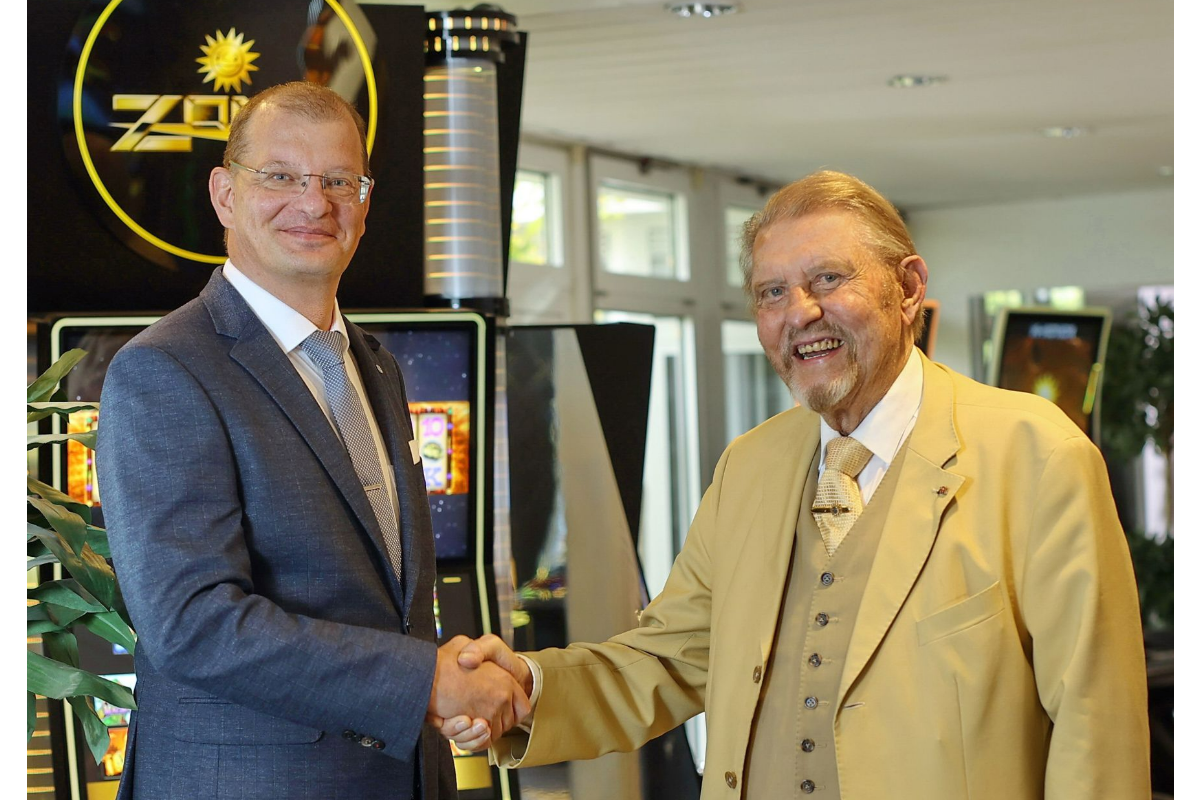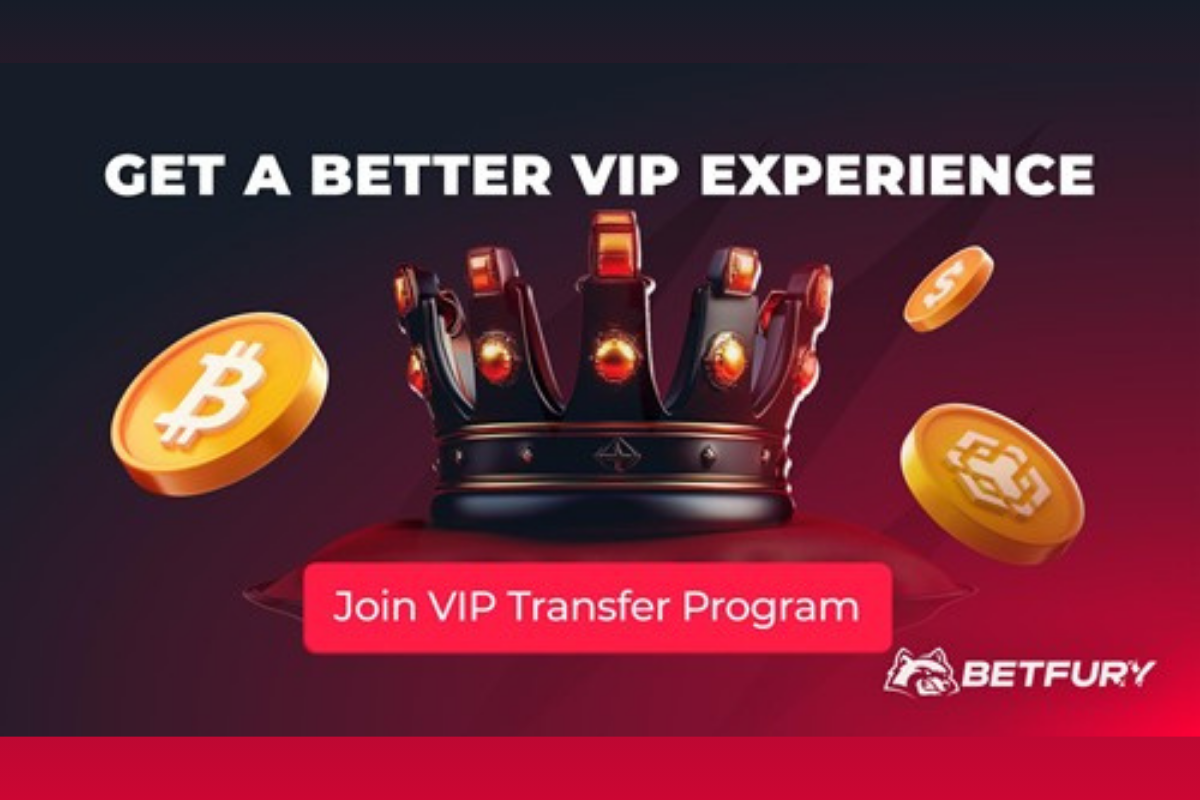

Latest News
Leadership transition within the Merkur Group
Paul Gauselmann steps down from the group’s executive management / Michael Gauselmann assumes the roles of Chairman of the Supervisory Board and the Board of Directors of the Gauselmann Family Foundation / Lars Felderhoff is appointed new Chairman of the Management Board
A new chapter is dawning for the Merkur Group as company founder Paul Gauselmann is set to retire as Management Board Chairman on 1 October, stepping back from the company’s executive leadership. For 67 years, he has shaped the destiny of the group, transforming a part-time one-man business into an internationally acclaimed group of companies with total sales revenues of around 4 billion euros and external sales revenues of over 2.7 billion euros. “I have consistently devoted my energy to the company’s welfare, and at the same time to the benefit of our approximately 15,000 employees,” he stated. “Now the time has come to entrust my life’s work to the younger generation,” explains Paul Gauselmann. Lars Felderhoff, 48, CFO of the Merkur Group, will assume the role of Chairman. He will be supported by Jürgen Stühmeyer (64), Management Board member with responsibility for sales, and Manfred Stoffers (70), Management Board member with responsibility for marketing, communications and political affairs, as vice-chairs. “I am delighted that this trio is taking over the helm. They are outstanding leaders with a deep understanding of the company,” adds Paul Gauselmann, who will continue his association with the company as a member of the Gauselmann Family Foundation.
A generational shift is also taking place on another level: Michael Gauselmann (68) is set to assume the role of Chairman of the Supervisory Board from Manfred Grünewald (89) on 1 October. He will also succeed Paul Gauselmann as Chairman of the Board of Directors of the Gauselmann Family Foundation. As the sole shareholder of the group, the Foundation is the hub for all fundamental strategic decisions. “I am thrilled that my son Michael is embracing this important responsibility and will contribute his international experience to our company,” states Paul Gauselmann. Michael Gauselmann, a business administration graduate, joined the group in 1982 and worked across all business segments. He advanced internationalisation by establishing the subsidiary Atronic in 1993, overseeing all foreign operations. For a decade, he served as Vice-Chairman of the Management Board before becoming Co-Chairman of the Group Management Board, sharing responsibilities with Paul Gauselmann from 2004 to 2012. From 2013, he was involved in the then Gauselmann Family Council and, from 2016, in the Gauselmann Family Foundation.
Lars Felderhoff will assume responsibility for executive management as the new Group Chairman. He has overseen the finances and organisation of the Merkur Group since 2018. He started his career in 2000 at the subsidiary Atronic. From 2007 to 2011, he expanded his expertise at the gaming group GTech (now IGT) and at Metro Cash & Carry International, a wholesale group. Felderhoff rejoined Merkur in 2011 as the Commercial Director of the adp Merkur subsidiary. In that capacity, he was in charge of commercial operations for the Merkur business segment, encompassing over 40 companies both in Germany and internationally. As a native of Rahden, he has close ties to the region and understands the roots of the corporate group. “The challenge is immense, and naturally, we will not be able to fill the shoes of an entrepreneur like Paul Gauselmann one-to-one. However, the company is robust and agile enough to continue setting new benchmarks in the future.”
He is assisted by the Management Board’s Vice-Chairs, Jürgen Stühmeyer and Manfred Stoffers. Stühmeyer, who hails from Minden, has dedicated 37 years to the Eastern-Westphalian company, starting as a trainee in 1987 and progressively advancing through the ranks. In his function as the Management Board member responsible for sales, he has directed the strategic orientation and commercial success of the entire Merkur pillar since 2007. Manfred Stoffers joined the company in 2011 as a consultant to the Chairman of Gauselmann AG, and was appointed Management Board member responsible for Marketing, Communications and Political Affairs in 2015.
Paul Gauselmann expressed great satisfaction with the top-level personnel changes, stating, “Reorganising the company by the time I turn 90 has been my wish for some time. We have accomplished this very well and are ideally positioned for the future, particularly as my son Michael, both a member of the Gauselmann family and an experienced entrepreneur, will continue to be involved in the most critical decisions.”
The post Leadership transition within the Merkur Group appeared first on European Gaming Industry News.
Latest News
BetFury Welcomes VIP Users with up to $20,000 First-Week Rewards

BetFury has recently set new standards for VIP communities worldwide. The platform has expanded the VIP Transfer Program, allowing players to carry over their loyalty status from other platforms and instantly unlock exclusive rewards. The first week brings an opportunity to claim up to $20,000, confirming BetFury’s position as a leader in player-focused innovation.
About VIP Transfer Program on BetFury
The program creates a direct bridge for experienced players. VIPs no longer start from zero – their loyalty is instantly recognized. A redesigned structure guarantees a smoother entry, transparent rules, and more powerful benefits. BetFury positions every VIP not simply as a player, but as a valued partner whose trust deserves premium treatment.
Core Benefits of the VIP Transfer Program
- Personal VIP Managers ensure constant support and fast solutions.
- VIP Transfer Manager guides the player during the first week, answering every request and ensuring their comfort.
- Daily Chambers is a streak of special bonuses during the first week.
- Exclusive Rewards expand the journey far beyond a trial, including a full range of permanent VIP perks.
Additionally, the VIP Club itself opens access to other unique perks:
- Special Treats: Welcome VIP Bonus, Birthday Bonus, Personal Bonus, Bounty Bonus, Free Spins, and Promo codes.
- Highest Bonuses: up to 25% Cashback, 10% Rakeback, Weekly, and Monthly rewards.
- Additional Perks: early access to new features, private events, personalized profiles, exclusive chat rooms, and privileged withdrawal limits.
- VIP Club Lounge: a dedicated hub where members track bonuses, claim rewards in one click, and communicate directly with their managers. Branded merch is also on the horizon.
Path to Super VIP Club Member
In addition to traditional ranks, the VIP Club includes the Super VIP stages. Players who remain active and reach the 15th rank achieve Super VIP status. It is reserved for the most loyal platform users. Higher levels deliver more substantial financial benefits, deeper personalization, and recognition that positions Super VIPs as the elite core of BetFury.
How to Transfer VIP Status to BetFury?
The process of joining the VIP Transfer Program eliminates unnecessary friction. Candidates follow three steps inside a straightforward interface:
- Providing contact details: email, country, Telegram (optional).
- Choosing the verification method: confirm your ability to be a VIP by depositing over $5,000 or sending screenshots of proof from other platforms.
- Completing the action: the deposit occurs directly in the modal window; screenshots are uploaded securely through the same form.
The VIP support team manually checks applications and confirms eligibility. Approval unlocks immediate access to all benefits, ensuring a seamless transition to BetFury’s VIP environment.
About BetFury & Its Strategic Vision
BetFury is an ecosystem of crypto products for entertainment and additional income. The platform has gathered over 4M users for over six years of existence. BetFury offers over 8,000 Slots and 22 Original games, featuring an impressive RTP of up to 99.28%. In addition to iGaming, the platform has 80 Sports for betting. They include eSports and have odds better than the market average.
BetFury positions the VIP Transfer Program as more than just a promotional campaign. The initiative demonstrates a global strategy aimed at strengthening long-term loyalty, attracting experienced users from multiple platforms, and creating a unified VIP ecosystem with real value behind the status.
Contact
Preston
Alisia
BetFury
The post BetFury Welcomes VIP Users with up to $20,000 First-Week Rewards appeared first on European Gaming Industry News.
Latest News
Podium’s Racing Data to Power Dabble’s Social-led Betting Service in the UK

Podium, a leading global provider of trusted sports content and data solutions, is working with Dabble to help bring its socially driven betting experience to UK audiences.
Dabble combines traditional betting functionality with a social media-style interface to offer the next generation of racing fans a more interactive way to connect and share. The app-based platform is integrated with Betmakers technology, with all UK horse and greyhound racing data delivered by Podium.
Ian Houghton, Commercial Director at Podium says: “At Podium, we are always excited when we see innovation in the industry, so we are delighted to play a part of Dabble’s expansion into the UK market, particularly at a time when the racing industry needs to retain a younger audience. We look forward to exploring how Podium’s services can continue to support Dabble’s global ambitions.”
The collaboration, which has been in place since the summer, marks an evolution in how racing data is used and experienced, with Podium delivering UK racing content via Betmakers technology to help power Dabble’s social platform.
Tom Rundle, CEO of Dabble, says: “Dabble’s move into the UK is a natural fit. We’re a challenger brand with an exciting product that we built ourselves from scratch. We’re already seeing that resonate with the UK audience. Yes, you can get a bet on, but essentially, we are placing ourselves as being community driven. We’re creating a richer experience at every touch point.”
The UK is Dabble’s third international market, following rapid growth after launching in its native Australia.
The post Podium’s Racing Data to Power Dabble’s Social-led Betting Service in the UK appeared first on European Gaming Industry News.
Campus Gambling
College Partnerships Under Scrutiny: The Future of Campus Gambling Deals – Compliance, Alternatives, PR Risk

The era of splashy sportsbook logos wrapped around student sections is fading fast, and for good reason. What looked like an easy revenue win after the expansion of legal sports betting now sits at the intersection of compliance complexities, reputational hazards, and evolving cultural expectations about how gambling interacts with college life. Universities are recalibrating their risk tolerance, athletic departments are revisiting sponsorship inventories, and operators are rethinking whether campus-facing marketing is worth the blowback. At Gambling Freedom Casino and News Portal, we’ve seen the conversation shift from “How big can this get?” to “How do we do this responsibly,or not at all?” The answer is not a simple yes or no; it’s a recognition that the future of campus gambling deals will be smaller, more carefully segmented, and anchored in integrity and harm minimization. That future rewards institutions and brands that can communicate clearly, document compliance rigorously, and operate with a “help-first, hype-later” mindset.
From a compliance standpoint, the baseline in 2025 is tighter than many casual observers realize. Industry marketing standards increasingly discourage promotions that could be perceived as targeting students, and the phraseology once common in acquisition campaigns is now off-limits or strongly discouraged. In parallel, more state regulators are scrutinizing college markets, especially player-specific proposition bets, on the grounds that they heighten the risk of harassment and integrity issues. The NCAA has spent the last few seasons pushing for stronger athlete protections and a more consistent compliance posture across jurisdictions. Put all of that together and the practical effect is clear: even if a category is technically legal in one state, the patchwork of rules, guidance, and best practices makes campus-facing deals a compliance headache and a reputational gamble. The safest route is to build partnerships that avoid student channels, exclude conversion-driven creative around college events, and lean into education, integrity, and alumni engagement where age gating and segmentation are both meaningful and auditable.
Reputational risk is the other half of the equation and it’s often underestimated until it isn’t. The optics of a sportsbook brand appearing inside a campus venue or in an email blast that lands in student inboxes can overshadow months of careful planning. In the digital age, a single misguided subject line or banner placement can live forever in screenshots, resurfacing whenever a university confronts unrelated controversies. For athletic departments, the blowback doesn’t just come from national media; local stakeholders, faculty governance, and alumni donors have strong opinions about how a school’s brand is used. The narrative can turn quickly: what a marketing team frames as “supporting athletics” can be framed by critics as “monetizing student attention with gambling.” Add the human dimension—students and athletes facing social media pressure tied to bets and the reputational calculus tilts further away from broad-based campus advertising. Once a school becomes the example cited in op-eds and parent forums, every future sponsorship meeting starts on defense, which is a tremendous tax on leadership attention and goodwill.
So where does that leave universities and sportsbooks that still want to collaborate responsibly? The first lane is alumni-only engagement that lives firmly outside student media. Think association newsletters sent to verified recipients, event activations tied to homecoming for over-21 alumni, and gated digital experiences where age verification and alumni status are both required. The operative phrase is segmentation with proof: CRM hygiene that suppresses any .edu domains associated with enrolled students, third-party age checks that withstand audit, and creative that emphasizes responsible play rather than acquisition gimmicks. It is equally important to leave campus-owned assets out of the plan entirely: no student newspaper, no student radio, no in-venue signage within sightlines dominated by under-21 attendees, and no .edu pages. Success here is measured by quiet compliance, not splashy vanity metrics. Campaign briefs should spell out what will not be done (no first-bet language, no odds boosts tied to school IP, no promo codes keyed to team names), and media buys should be geofenced and frequency-capped to avoid spillover impressions.
The second lane is integrity and data cooperation, which is fundamentally different from marketing. Rather than converting users, these partnerships focus on protecting competitions and people. Universities and operators can align around standardized reporting protocols for suspicious activity, training modules for staff and athletes that explain wagering rules and red flags, and secure data exchanges that support real-time anomaly detection. When structured correctly, integrity agreements do not place sportsbook logos on campus; they establish clear lines of responsibility, define escalation paths if something looks off, and include audit rights to ensure both sides are living up to the agreement. Forward-thinking athletic departments are building dashboards that track integrity KRIs (key risk indicators) across seasons, and operators are assigning compliance liaisons who can respond quickly to questions about markets, limits, and emerging risks. A valuable signal of sincerity is a proactive stance on contentious markets: choosing not to market college player props or removing them from any alumni-facing creative, sends a message that athlete wellbeing matters more than marginal handle.
A third lane is responsible-gambling (RG) education and independent research, an area where universities can lead with credibility if the funding and governance are set up correctly. The rule of thumb is “help, not hype.” Programming should elevate helplines and support resources, teach students and staff how to recognize early warning signs, and outline practical steps for friends or teammates who are worried about someone’s gambling. Workshops can be built for specific audiences, athletes, coaches, RAs, student leaders – with content tailored to situations they’ll likely encounter, like managing group chats during big games or dealing with harassment tied to a missed free throw. If an operator helps fund this work, the branding should be deliberately muted and the calls to action should point to counseling resources, not betting apps. On the research side, schools can host longitudinal studies on gambling behaviors and mental health that inform policy decisions across states. The key is independence: academic freedom, publication rights, and data privacy are non-negotiable. When these programs release annual reports with outcomes numbers trained, referrals made, satisfaction and knowledge retention scores, they earn trust with regulators and the public.
Embedding all of the above in real governance requires contracts and processes that are as rigorous as anything in broadcast rights or apparel. Agreements should explicitly exclude student-facing channels and campus IP in promotional contexts, require preclearance of all creative, and mandate third-party age and identity checks for any alumni lists used in marketing. Internal workflows matter just as much: establish a cross-functional signoff path that includes compliance, legal, athletics communications, the alumni office, and student affairs; maintain a living registry of all placements; and document every exception request and rejection. A quarterly audit, conducted by an independent partner, should test suppression lists, confirm geo and age parameters, and sample creatives for prohibited phrasing. Crisis preparedness is part of the job: have templates ready for misdirected emails, rogue social posts, and policy changes that force offer adjustments mid-season. Run tabletop exercises with leaders so everyone knows who approves the statement, who pauses the media, who contacts the vendor, and who answers reporter questions. The smoothest crises are the ones that never become public because the response is instant and well-rehearsed.
Looking ahead, the most realistic forecast is a smaller, safer lane for college–operator collaboration. Expect states and conferences to continue refining rules around bet types and advertising, particularly where athlete wellbeing and harassment are implicated. Expect universities to sunset remaining campus-facing placements in favor of alumni-only channels that leave a clean paper trail, lowering both compliance risk and noise around brand stewardship. Expect the integrity conversation to mature, with more standardized data formats, quicker reciprocity on investigations, and better education for the non-athlete campus community, resident advisors, counseling centers, and compliance staff who are often the first to notice when something is off. And expect that schools which articulate a clear philosophy- “We protect students, we protect athletes, we promote help-seeking, and we partner only where age-gated, auditable outcomes exist”, will spend less time in reactive posture and more time telling a positive story about values.
For operators, the business case is quiet credibility. Instead of chasing a fleeting burst of signups tied to a rivalry game, smart brands will invest in long-term reputation: integrity agreements that make competitions safer, alumni engagements that demonstrate real respect for age limits and context, and RG programs that exist to serve the community rather than acquire customers. That approach doesn’t just avoid headlines, it earns allies. Alumni who see careful, adult-only engagement are less likely to bristle at a brand’s presence. Regulators who see documented controls and public reporting are less likely to question motives. University leaders who see proof of restraint are more open to renewing low-risk collaborations. In other words, the playbook that Gambling Freedom recommends is not “do nothing,” but “do the right things, in the right places, for the right reasons.”
The final takeaway is simple: campus gambling deals are no longer a volume game; they are a values game. If your plan cannot be explained in a sentence that starts with student safety, athlete wellbeing, and competition integrity, it’s probably the wrong plan. If your KPIs are built around alumni engagement quality, RG outcomes, and zero incidents—not just clicks and codes, you’re on the right track. And if your processes assume that everything might one day be scrutinized by parents, faculty, alumni, and policymakers, you will build the sort of resilient partnership that can survive news cycles and leadership changes. Gambling Freedom exists to help universities and sportsbooks navigate precisely this terrain, compliance-conscious, PR-smart, and responsibility-first – so that whoever partners on college sports can do so with confidence, clarity, and respect for the communities they serve.
The post College Partnerships Under Scrutiny: The Future of Campus Gambling Deals – Compliance, Alternatives, PR Risk appeared first on Gaming and Gambling Industry in the Americas.
-

 gaming3 years ago
gaming3 years agoODIN by 4Players: Immersive, state-of-the-art in-game audio launches into the next generation of gaming
-
EEG iGaming Directory8 years ago
iSoftBet continues to grow with new release Forest Mania
-
News7 years ago
Softbroke collaborates with Asia Live Tech for the expansion of the service line in the igaming market
-
News7 years ago
Super Bowl LIII: NFL Fans Can Bet on the #1 Sportsbook Review Site Betting-Super-Bowl.com, Providing Free Unbiased and Trusted News, Picks and Predictions
-
iGaming Industry8 years ago
Rick Meitzler appointed to the Indian Gaming Magazine Advisory Board for 2018
-
News7 years ago
REVEALED: Top eSports players set to earn $3.2 million in 2019
-
iGaming Industry8 years ago
French Senator raises Loot Boxes to France’s Gambling Regulator
-
News7 years ago
Exclusive Interview with Miklos Handa (Founder of the email marketing solutions, “MailMike.net”), speaker at Vienna International Gaming Expo 2018











